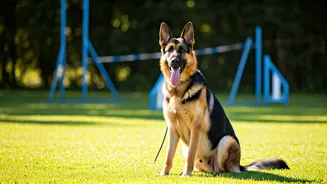Understanding German Shepherds
German Shepherds are renowned for their intelligence, courage, and loyalty, originating from Germany in the late 19th century. They were initially bred
for herding sheep, which explains their natural inclination to follow instructions and respond to commands. Their versatility quickly became apparent, leading to their widespread use in various roles, including police work, search and rescue, and as family pets. Their protective nature makes them excellent guard dogs, always alert and watchful. However, this protective instinct requires careful socialization from a young age to ensure they distinguish between threats and friendly interactions. A well-trained German Shepherd is a joy to have around, offering companionship and security while thriving on mental and physical stimulation. They require consistent training, proper socialization, and a diet appropriate for their size and activity level. Their size and energy levels mean they need plenty of space and exercise to remain healthy and happy.
Early Socialization is Key
Exposing your German Shepherd puppy to various environments, people, and other animals from an early age is vital. This process helps them develop into well-adjusted adults, less prone to fear or aggression. Start socialization as soon as your puppy has received their initial vaccinations. Take them to parks, introduce them to different noises and surfaces, and allow them to interact with a wide range of people and other friendly, vaccinated dogs. Positive experiences during this critical period shape their temperament for life. Supervise all interactions closely, and make sure they are always positive and safe. If your puppy seems overwhelmed or scared, gently remove them from the situation and try again later. Focus on rewarding calm and friendly behavior with treats and praise. Continue socialization throughout their life. Even a well-socialized adult dog can benefit from ongoing exposure to new experiences to maintain their adaptability. Consider enrolling in puppy classes where they can learn basic obedience skills while interacting with other dogs. Regular walks in different areas and playdates with familiar, friendly dogs are also excellent ways to maintain their social skills.
Effective Training Methods
Positive reinforcement is the most effective approach to training a German Shepherd. This method involves rewarding desired behaviors with treats, praise, or toys. Avoid punishment-based training methods, as they can damage your dog’s trust and create fear or anxiety. Keep training sessions short and frequent, ideally a few times a day for 5–10 minutes. German Shepherds have a strong desire to please, making them highly responsive to training. Start with basic commands like sit, stay, come, and down. Use clear, concise verbal cues and hand signals. When your dog successfully performs a command, immediately offer a reward. Gradually increase the difficulty of the commands and the duration of the exercises. Consistency is paramount. Everyone in the household should use the same commands and reinforce them consistently. Consider using clicker training, where a clicker is used to mark the exact moment your dog performs the desired behavior. This helps them understand what action earned the reward. Introduce distractions gradually as your dog progresses to generalize the commands in various environments. Consistency in training builds a strong bond and ensures your dog is well-behaved.
Mental Stimulation & Exercise
German Shepherds are intelligent and energetic dogs, requiring both mental stimulation and physical exercise to stay happy and healthy. A bored German Shepherd can become destructive or develop behavioral problems. Provide plenty of opportunities for mental engagement. This includes interactive toys, puzzle games, and training sessions. Change up the toys and activities frequently to keep them interested and challenged. Physical exercise is also crucial. Aim for at least 1–2 hours of exercise daily, including walks, runs, and playtime. German Shepherds thrive on activities like fetch, agility training, and hiking. Ensure their exercise matches their age, health, and fitness level. Puppies require shorter exercise sessions to avoid overexertion. Adapt their exercise routine to the weather, providing shade and water during hot days. A balanced approach with mental and physical stimulation helps prevent boredom, reduces anxiety, and strengthens the bond between you and your dog. A tired, mentally stimulated German Shepherd is a well-behaved and content companion, thriving in a home that offers both activity and cognitive challenges.
Addressing Behavioral Issues
Even with consistent training, German Shepherds may exhibit unwanted behaviors. Common issues include excessive barking, chewing, separation anxiety, and aggression. Early intervention is vital. If you observe behavioral problems, consult a professional dog trainer or a certified veterinary behaviorist. They can help identify the root cause of the behavior and develop a tailored treatment plan. Excessive barking can stem from boredom, anxiety, or territoriality. Ensure they get enough exercise, mental stimulation, and socialization. Chewing is a normal behavior for puppies, but it can be destructive if not managed. Provide appropriate chew toys and redirect their chewing to these items. Separation anxiety can manifest as destructive behavior, excessive barking, or pacing when left alone. Gradually acclimate your dog to being alone. Start with short periods and progressively increase the duration. Create a safe, comfortable space for them to relax. Aggression may arise from fear, lack of socialization, or territoriality. Identify triggers and work with a professional to desensitize your dog. Never punish your dog for aggressive behavior, as this can worsen the issue. Patience, consistency, and professional guidance will help you address these behavioral issues effectively, ensuring a harmonious relationship with your German Shepherd.

















